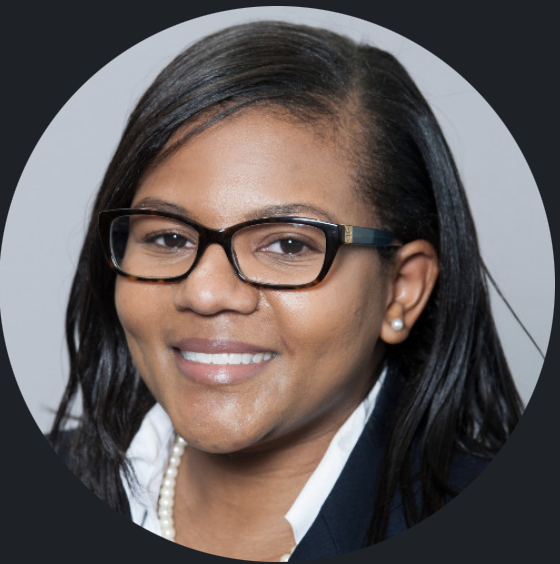
Arcola Whatley has joined the CSU Cleveland-Marshall College of Law faculty as Director of the school’s new Pardon, Clemency, and Expungement Clinic, launched earlier this year.
Whatley, a graduate of Western Michigan University’s Thomas M. Cooley Law School, was most recently a Staff Attorney/Lecturer at the Case Western Reserve University School of Law, where she worked with the school’s Second Chance Reentry Clinic and Media Law and Free Expression Practicum. She has also served as a staff attorney at the Legal Aid Society of Cleveland and has worked in the City of Cleveland’s Law Department and Department of Public Works.
“I see law as a helping profession, and I knew that I wanted to use my talents and education for the benefit of others,” explained Whatley. “I can be a partner with my clients on the road to making major life changes so they can secure one of life’s basic necessities that ripples through the rest of their life and the life of their family and community. It’s about stabilizing the foundation of a community, one person or family at a time, so that we can build healthier families, stronger communities, and eventually a more just world.”
The new CSU C|M|LAW Clinic will represent clients seeking pardon or clemency from the Ohio Governor, or expungement of a prior conviction from a court. The Clinic was developed through a partnership with the Ohio Governor’s Expedited Pardon Project (OGEPP). Governor Mike DeWine launched the OGEPP in 2019 to fast-track the pardon applications of specific candidates who have become law-abiding and contributing members of society. Since the project’s launch, 16 applicants have been pardoned with 86 others in various stages of the application process. CSU C|M|LAW will receive renewable funding through the partnership to sustain the Clinic’s operations.
Whatley explained that there are over 850 collateral sanctions in Ohio that can perpetuate the stigmas attached to someone with a criminal record that can hinder them as they try to rebuild their lives. Pardons, record sealing, and/or expungement allow individuals greater employment, housing, licensing, insurance, and volunteering opportunities so they can better reintegrate into society.
“Working with the Legal Aid Society of Cleveland, I learned just how important it is to an individuals’ sense of security--and the well-being of a community--to have meaningful work, health care and affordable housing,” said Whatley. “We only get to a better society when we allow the people in it to be better versions of themselves. And that’s what working in public interest and specifically in pardons and expungements does: we allow people to be better versions of themselves.”
Whatley’s work at the Legal Aid Society included providing legal assistance for released prisoners as they reentered society and executing applications for record sealing for juveniles and adults as well as applications for Certificates of Qualification for Employment (CQE). At the CWRU Second Chance Reentry Clinic, she designed the curriculum, metrics for success, and intake and acceptance processes for law students’ experiential learning focused on record sealing, CQE’s and Expedited Pardon applications.
For Whatley, this new position at the clinic is an opportunity to return to public interest law where she has spent the bulk of her career. She has always found the work intellectually stimulating and enjoys working with the reentering population. Getting to focus on this important sector while also working with students in an educational setting makes this the perfect fit.
“Being at a law school is invigorating,” said Whatley. “You get an opportunity to see the world from the students’ perspectives, while giving them the ‘cheat codes’ you’ve picked up along your own life journey.”
The CSU C|M|LAW Pardon, Clemency, and Expungement Clinic will partner on the project with LegalWorks, a Cleveland-based legal non-profit organization. Clinic students will also attend planned community outreach events in conjunction with the Cuyahoga County Public Defender’s Office and the Cuyahoga County Office of Reentry. Whatley wants to create a strong presence for the Clinic among the community and to build a network among various service providers who already have contact with the very individuals who need assistance.
While the Clinic will achieve success by obtaining pardons/expungement/record sealing for its clients, the legal and client-relation skills its students will develop are also an important component of the Clinic’s mission.
“Clinics are vital to the legal process because it introduces our next generation of lawyers, through live-client practice and skill development, to a practice wholly devoted to helping others get a new start on life,” said Whatley. By the end of the semester, I want my students to be confident in what comes next for the client because they’ve done the research, seen how the process works, observed the courtroom, and have arrived at that place of inner confidence, knowing ‘I can do this’.
“I also want the students to understand how the interplay between poverty and the criminal justice system has created roadblocks and pitfalls that, unfortunately, some individuals were unable to get around or avoid and now they find themselves stuck in a rut because of previous bad decisions,” Whatley continued. “I consider the law profession both a helping profession and a position of privilege and I want them to move through the world understanding the weight and power behind those ideals.”
